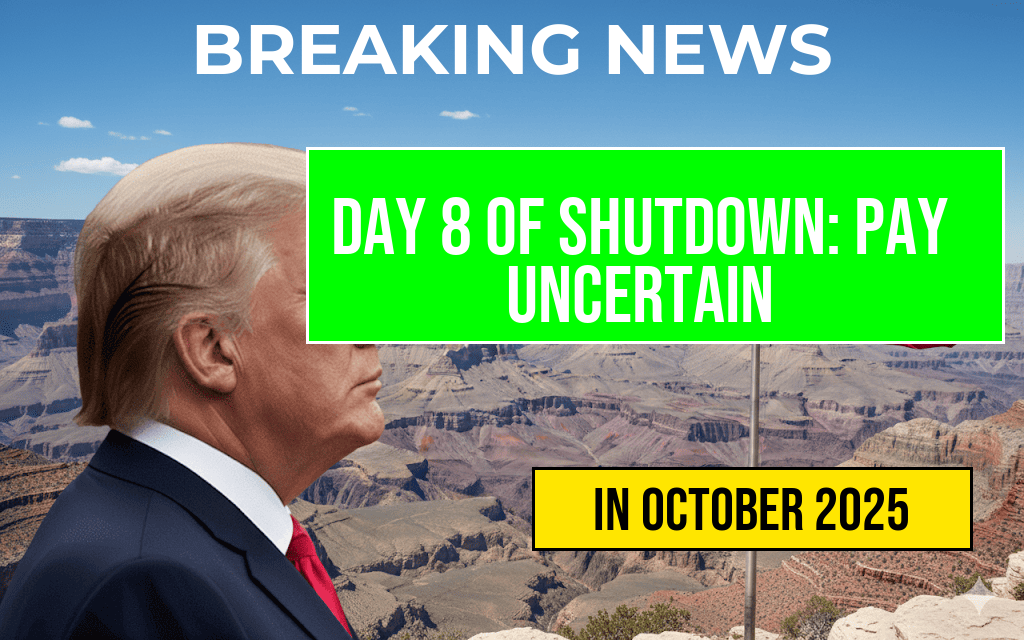As the federal government enters the eighth day of its partial shutdown, uncertainty looms over the compensation of federal workers. With the deadline for a budget resolution approaching, employees across various departments are left wondering whether they will receive full pay, partial compensation, or nothing at all. The shutdown, triggered by political impasses regarding government funding, has affected hundreds of thousands of workers, many of whom rely on their federal salaries to meet daily expenses. The ongoing situation raises crucial questions about the financial and emotional toll on employees, as well as the potential repercussions for government services. As discussions continue in Congress, the fate of these workers hangs in the balance, prompting them to seek clarity and support during this challenging time.
Understanding the Shutdown’s Impact on Federal Workers
The current shutdown has led to a significant number of federal employees being placed on unpaid leave, while others are working without immediate pay. This situation poses a stark contrast to previous shutdowns, where the majority of federal workers eventually received back pay once the government reopened. However, this time, the political climate is markedly different, raising concerns about the possibility of delayed compensation.
What Federal Workers Can Expect
- Unpaid Leave: Many federal workers have been deemed non-essential and are currently on unpaid leave.
- Essential Employees: Those classified as essential are required to work but may not receive pay until the shutdown ends.
- Back Pay Uncertainty: The likelihood of receiving back pay remains uncertain, depending on how negotiations unfold in Congress.
The Political Landscape
The shutdown stems from a stalemate in Congress over budgetary allocations. Lawmakers are divided on various issues, including funding for specific programs and overall government spending limits. This impasse has led to a mounting pressure on both sides to reach a compromise that could restore funding and end the shutdown.
Key Issues at Stake
- Funding Disputes: Disagreements over budget priorities have stalled progress, affecting not only federal employees but also the services they provide.
- Public Services: Many government services have been disrupted, impacting citizens who rely on them, further complicating the political negotiations.
- Long-term Consequences: Prolonged shutdowns can have lasting effects on employee morale and public trust in government institutions.
Historical Context of Federal Shutdowns
Federal shutdowns are not new to the U.S. government, with the first occurring in 1980. According to Wikipedia, the most prolonged shutdown lasted 35 days, from December 2018 to January 2019. During that period, federal workers faced significant challenges, and many were left without pay for extended periods. History shows that bipartisan efforts often lead to resolutions, but the current political environment suggests a more challenging path ahead.
Public Opinion and Support for Federal Workers
As the shutdown continues, public opinion has begun to shift. Many citizens express support for federal workers, with grassroots movements emerging to provide assistance. Local communities are rallying around those affected, organizing food drives and financial assistance programs to help ease the burden of unpaid wages.
Looking Ahead
As negotiations continue, the urgency for a resolution grows. Federal workers remain hopeful for a swift end to the shutdown and the restoration of their pay. The outcome will not only affect their immediate financial situation but also set a precedent for future budgetary negotiations. Stakeholders from both sides of the aisle are urged to consider the implications of prolonged shutdowns on public services and the well-being of federal employees.
Conclusion
The next few days will be crucial for federal workers as they await news from Congress. With the potential for both short-term and long-term consequences hanging in the balance, the focus remains on achieving a resolution that addresses the needs of federal employees while navigating the complex political landscape.
Frequently Asked Questions
Will federal workers receive any pay during the shutdown?
During a federal shutdown, many federal workers may receive no pay until the government reopens. However, some essential employees may be required to work without pay during this period.
What happens to federal workers’ pay once the shutdown ends?
Once the shutdown is over, federal workers are typically entitled to receive retroactive pay for the duration of the shutdown, ensuring they are compensated for the time they were unable to work.
Are there any exceptions for certain federal employees regarding pay during the shutdown?
Yes, certain federal employees, such as those in essential services, may be required to work and will not receive pay until the shutdown is resolved, but they will eventually receive pay for their services.
How can federal workers prepare for a potential lack of pay during the shutdown?
Federal workers can consider creating a financial plan to manage their expenses, such as saving money in advance and exploring temporary job opportunities, to help mitigate the impact of a shutdown.
Is there any assistance available for federal workers during a shutdown?
Yes, various organizations and federal programs may offer financial assistance or resources to help federal workers cope with the economic challenges posed by a government shutdown.

Leave a Reply